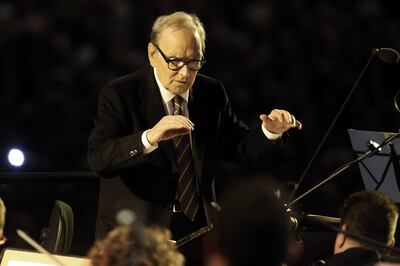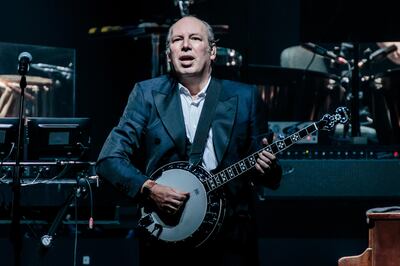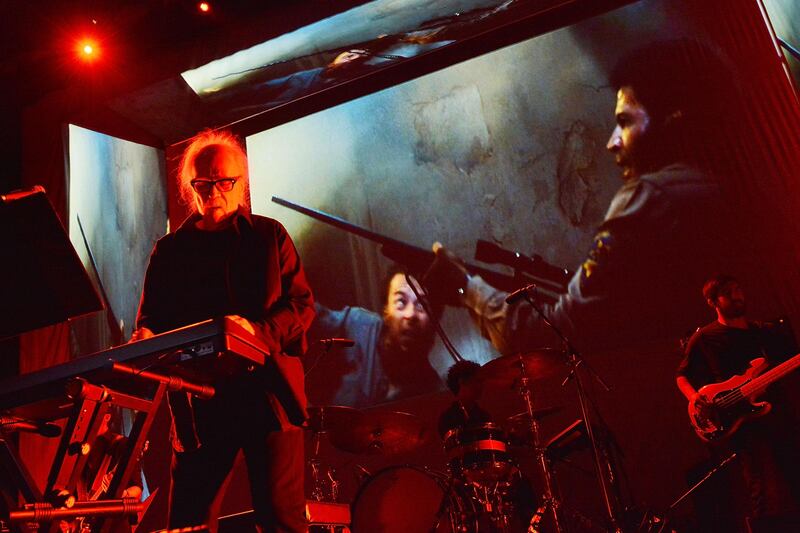Once dismissed as workmanlike guns for hire, and only most fleetingly welcomed into snobby classical circles, recent years have seen film composers fervently embraced by the mainstream – these invariably balding eccentrics elevated to incongruous rock stars, playing to reverent festival crowds otherwise unlikely to touch instrumental music with the longest of sticks.
Perhaps the most improbable reinvention is that of John Carpenter, the director behind Halloween, Assault on Precinct 13, Escape from New York and a long list of B-movie-flavoured "cult classics" generally the reserve of more discerning horror-movie aficionados.
The auteur lovingly dubbed "JC" famously composed most of the music to his movies – conjuring a brand of thick, shlockly, synth-tracked tautness that today strikes either a charming note of nostalgic spook or dated shtick, depending on where you're sitting in the proverbial cinema.
The best of these scores have belatedly been collected on Carpenter's new compilation Anthology: Movie Themes 1974-1998, released on Friday.
Under this magnifying glass of adoring nicheness, such a release might not sound all that remarkable. But this “greatest hits” package is attracting an audience far beyond the film-buff faithful, following Carpenter’s late-career emergence as a touring headline attraction.
For the past two years, the American director has brought rock-flavoured live versions of his electronic dirges to huge hipster audiences at scene-making festivals such as the British-founded All Tomorrow's Parties and Barcelona's Primavera Sound. His reinvention complete, the self-described master of horror – that's actually his Twitter handle (@TheHorrorMaster) – now seems more interested in music than movies.
The swaggering Anthology follows his first two "original", non-soundtrack solo albums – the well-received Lost Themes and Lost Themes II, from 2015 and last year respectively – while later this month, his essentially 1980s aesthetic will hit the road again for a North American album promo tour.
A similar belated afterglow has washed ashore the life and work of Ennio Morricone, the Italian icon best known for scoring Sergio Leone's Dollars Trilogy, starring Clint Eastwood, as well as Terrence Malick's Days of Heaven, Brian De Palma's The Untouchables and dozens more award-winners.
While he has been an onstage attraction since the 1980s, a renewed public embrace has latterly seen the 88-year-old pack out venues the size of London’s The O2 on an ongoing, globetrotting tour.
Morricone owes some thanks to fanboy Quentin Tarantino, who employed the composer to score his last picture The Hateful Eight.
In ticket sales and streams, Morricone is perhaps only rivalled by Hans Zimmer, film music's undisputed "rock star". His words not mine – "Hans-Zimmer.com – Rock Star" is the title of his official home page. Still, it is hard to argue with the mighty German monolith, who earlier this month wrapped up an international arena tour, capped by a slot at Coachella – an enviably hip gig celebrated by jamming on The Late Show with Stephen Colbert.

Adverts for his Hans Zimmer Teaches Film Composition online masterclass have become daily punctuation to my personal YouTube playlist.
Feted with an Oscar in 1995 for The Lion King, 60-year-old Zimmer has enjoyed a stranglehold on all things epic and wide-screen since scoring Ridley Scott's Gladiator (2000).
The trademark "Zimmermusik" – characterised by rumbling dissonance, deep horn blasts, nervous ticking and those oft-imitated spiralling string lines that appear to rise in pitch forever – was established with his work for director Christopher Nolan, including work for Inception, Interstellar and Dunkirk.
Having also notched lucrative deals scoring The Da Vinci Code, numerous superhero reboots (Man of Steel, The Amazing Spider-Man 2), and across the Pirates of Caribbean franchise, it is no exaggeration to say Zimmer is the sound of modern Hollywood at its most bombastically mainstream.
His greatest achievement might be scores for Nolan's Batman trilogy – Batman Begins, The Dark Knight and The Dark Knight Rises – which assuredly introduced a distinctly darker voice to a series that already had memorable themes in Danny Elfman's earlier scores on Batman and Batman Returns.
Not coincidently, Elfman himself has also enjoyed a late live-career resurgence, performing works drawn from his decades as Tim Burton's loyal sidekick, scoring Edward Scissorhands, Mars Attacks! and Charlie and the Chocolate Factory, among others.
Elfman hosts two concerts at Paris's Palais Des Congrès this Saturday and Sunday. Most recently, Zimmer was called in at the 11th hour to compose the music to Blade Runner 2049 – just weeks before the blockbuster's release this month – after two earlier scores were rejected from Brooklyn hip-hop producer El-P and Jóhann Jóhannsson (a blow for the Icelandic composer who previously scored director Denis Villeneuve's Prisoners, Sicario and Arrival).

So ubiquitous is Zimmer's brand of bombast that The Guardian recently published an article entitled "Have we reached peak Hans Zimmer?", which essentially argued that for all his talents, he should probably take a break and let somebody else have a go.
Now even Zimmer's protégé's are reaping the fruits, such as Ramin Djawadi, described by The Atlantic as Zimmer's "counterpart in television", currently touring his big breakthrough as the Game of Thrones Live Concert Experience.
While Zimmer's crossover appeal may be unrivalled, it is far from unprecedented. He stomps in the same shoes as John Williams, who became a household name during his long relationship scoring Steven Spielberg's almost entire oeuvre, authoring immortal themes for Jaws, the original Indiana Jones series, Schindler's List, ET the Extra-Terrestrial and Close Encounters of the Third Kind.
There is also the small matter of Williams work scoring the entire Star Wars saga – a whopping 16 hours of music – and the first three Harry Potter instalments. He has won 23 Grammys in the process.
Such exposure opened stuffy old doors, and since the 1980s, Williams has also taken gigs conducting many high-profile orchestras, making annual appearances with the Los Angeles Philharmonic at the Hollywood Bowl.
Today, at the stately age of 85, Williams need not turn up at all to bring in the crowds, with touring orchestras bringing his works to life – such as the 21st Century Symphony Orchestra's April visit to Dubai Opera, accompanying screenings of Jurassic Park and Raiders of the Lost Ark with live performances of William's scores – a throwback to the days of silent cinema being replicated at a worrying rate in concert halls across the globe.
Zimmer most recently turned heads by announcing a duet with alt-rock's reigning royals Radiohead on the haunting, ethereal (Ocean) Bloom, which sees singer Thom Yorke's voice surreally soundtracking the BBC's natural history series Blue Planet II. It is an appropriate collaboration from a band with their own cinematic sense.
Radiohead guitarist Jonny Greenwood has proved among the most prolific of a generation of popular musicians to turn to instrumental film composition, scoring a run of indie-flavoured flicks including There Will Be Blood, Norwegian Wood and The Master.
An emerging contemporary is Bryce Dessner – best known as guitarist with The National – who made soundtrack contributions to the US western The Revenant and 2015 Palme d'Or winner Dheepan.
This highlights an interesting reverse trend – as film composers are embraced as rock stars, a growing number of popular musicians are trying their hands at the instrumental score, a notably more demanding, higher-risk/lower-yield strategy than the conventional Hollywood pop-music theme.
The most successful recent crossovers include Trent Reznor's score for The Social Network and Daft Punk's for Tron: Legacy, while earlier head nods are deserved for Air's work on The Virgin Suicides and Nick Cave and Warren Ellis's soundtrack to The Proposition.
_________________
Read more:
[ How Dubai rocker Nikhil Uzgare of Point of View found his niche in Bollywood ]
[ Soundtrack to our lives: the powerful role of music in films ]
[ Listen: Top 5 movie soundtracks ]
_________________
An intriguing reverse crossover has recently been attempted by Clint Mansell, former lead singer of acclaimed British rock band Pop Will Eat Itself. He later became better known as Darren Aronofsky's go-to composer – scoring the divisive director's Pi, The Fountain, Requiem for a Dream, The Wrestler and Black Swan – as well as bringing his atmospheric, ambient stylings to sci-fiction successes Moon and Ghost in the Shell.
Now Mansell is crossing back to where he started – onstage – last year mounting a soundtrack tour of European concert halls that ordinarily echo with the sound of classical symphonies.
All this role-reversal might at least in some way be explained as a product of the digital age, which has an uncanny habit of breaking down barriers between mediums and genres.
Forgotten or niche movie themes are now never more than a click away, and listeners who would never buy a whole instrumental soundtrack might readily stream or download the hummable theme to Jaws or Dunkirk – and then later stump for a concert ticket to hear the same music live.
In 2017, it often feels snobbery is no longer an option – and the worlds of film and music alike are doubtless richer for it.
John Carpenter’s Anthology: Movie Themes 1974-1998 is released on October 20





